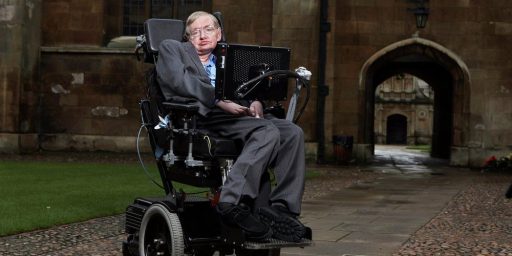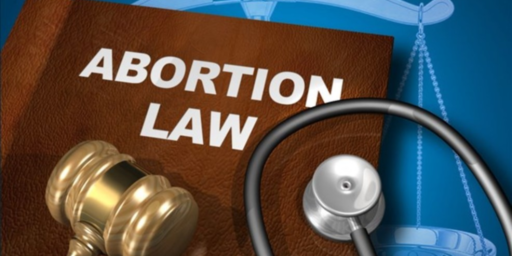Hitler, Mozart, and Abortion
Gerard Vanderleun laments the social cost of abortion, wondering, “Of all those babies we destroyed, how many were Einsteins, how many were Mozarts?” Harvey Olson retorts, “Statistically, about as many as there were Hitlers, Dahmers, and Chos.”
A debate ensues about the statistical likelihood that a given aborted fetus would mature into a genius vice a sociopath with a side argument about their relative value. Harvey observes, “I’d give up Jim Henson for Karl Marx. I love muppets, but I *really* hate communism.”
Amusing as that all is, it strikes me that, if the argument for abortion hinges on the exceedingly small chance that a given fetus would mature into a future Einstein or Shakespeare, the pro-choice side wins. Surely, statistically unlikely possibilities are no reason to restrict people’s freedom, especially on such an important matter as becoming responsible for the care of a child for two decades or more.
Either the unborn child is a human being, with certain inalienable rights, or it isn’t. If it is, then it deserves to live regardless of whether it might grow up to discover the cure for cancer.






And therein lies the true heart of the debate. So depending on your view of the subject, the pro-choice people put, Hitler, Stalin, Pol Pot, Mau Tse Tung and other mass murders to shame by racking up a large kill count than all of them combined.
But if you think the fetus is just a mass of cells, then how dare other busy bodies interfere with what you want to do with your body.
I think if we could settle on a common definition of “human being” the matter would resolve itself.
As I see it, “human being” is a threshold reached when a thing has the following attributes:
1) alive
2) genetically a member of homo sapiens sapiens
3) a complete organism unto itself
Once that threshold is reached the human attribute isn’t recinded except by death.
It’s the third requirement that excludes a fetus until late pregnancy (when it can survive disconnected from the mother without machines taking on the mother’s role). But without that requirement you end up with nonsensical results like a donor kidney being a human being unto itself.
This seems to me the most rational definition. Anyone else want to take a stab at it (no pun intended).
especially on such an important matter as becoming responsible for the care of a child for two decades or more.
Or really, at most, the commitment to carry the pregnancy to term.
Unfortunately, the time of viability can’t be determined arbitrarily much more specifically than “early in the third trimester”. There have been cases of infants born at 6 1/2 months who survived without incubation.
I think there’s another way of looking at this entire question: what’s good public policy? What we’re doing now is lousy practically no matter how you look at it.
The obvious counterexample: the parasitic twin. Anyone that thinks of them as as human as you or I has some messed up intuitions.
The upshot is that those 3 traits are unable to capture our intuitions, and shouldn’t be used to extrapolate moral rules.
Sorry, Tlaloc, I didn’t read your comment closely, which clearly accounts for the case of parasitic twins.
I do think that viability as used is a bit incongruous – when we talk about viability, we usually mean that it can survive outside the womb, even if its hooked up to machines and couldn’t survive but for the artificial wombs of the preemie ward.
And I’d imagine that it wouldn’t be too hard to keep a parasitic twin alive outside its host.
What that tells me is that true viability means being able to survive w/o mechanical assistance (respirators, eg).
I’m sure that a consensus of obstreticians can be reached. Such a rule could be based upon a particular time or on some somatic development of the fetus. Of course it won’t be perfect, any more than the arbitrary choices for voting age, age of consent, or driving age are perfect.
Defining “good” in this instance how? The problem is that people have wildly varying ideas of what society should be, and so wildly different ideas of what is good for it.
For instance I have very little problem with the current arrangement, and clearly you do.
I agree that the term viability is troublesome. I frequently refer to “true viability” which I define as “developed to the point where the fetus, if removed from the womb, could survive with no more care than a full term baby needs.”
Tlaloc,
Of course part of the problem with the definition is what can be done by the definer. Hitler and his minions did not feel remorse because they weren’t killing people, just something that might have some similarity to people but were untermenschen. The less than a person category was expanded to Gypsies, mental and physical defectives, homosexuals, etc.
And as far as being a complete organism unto itself, look up what happens when infants are deprived of human touch. Since they die without it, can they really be considered a complete organism unto themselves. We both have parasites in our body that absent them, we would find life much less enjoyable (try a strong course of anti-biotics if you don’t know what I mean). So is anyone truly a complete organism unto themselves given the number of symbiotic relationships.
I agree that drawing the line anywhere is very difficult. Just about anywhere you draw the line, you can find exceptional cases on either side.
On the other hand if we blithely classify all human tissue as human beings we suddenly live in a world where takng a shower is genocide.
Either extreme is unacceptable. so we need a good definition based on something real (which the nazi definition was not).
What definition are you proposing?
Sure they are. They also need food and air just like every other organism (okay there are anaerobic bacteria who don’t need air). Being a complete organism doesn’t mean you can live in a vacuum. It just means your body is capable of carrying on the life processes itself.
Doesn’t independant viability begin when the blob of protoplasm is gainfully employed?But I guess that might exclude half of academia?
Do any of you actually believe in God?
You cannot be a Christian and believe in abortion or abortion rights. Period.
Christopher; I certainly do!
[I hope you recognize the sarcasm in my post]
Christopher,
Wrong, wrong, and…. wrong.
You can’t be a Catholic and believe in abortion rights, but there are numerous sects of Christianity that don’t take the hard-line on ‘the soul enters at conception’. Or are those churches not ‘real Christians’? ‘Cause I don’t recall that topic coming up specifically in any of Christ’s sermons…
Maybe you didn’t hear me, legion:
You cannot be a Christian and believe in abortion or abortion rights. Period.
Perhaps a clarification then, the organism must be able to survive without the presence of a specific individual. An infant can survive with the care of any capable adult, a fetus can only survive in the womb of one specific adult.
Being a Christian requires only the belief and acceptance of Jesus Christ. At least that is what the Bible says, others may have different definitions of the word.
Now granted that full belief in and acceptance of Jesus Christ should predispose you to being anti-abortion, but the former is not strictly a prerequisite of the latter.
I heard you, Christopher, I just don’t understand you. Are you taking it upon yourself to define Christianity? Do you consider Anglicans and most Protestants to be something other than Christians? Not even the Pope is willing to make such a sweeping statement (at least, not in the last few centuries…).
I mean, the injunction against taking life goes back at least to the OT Commandment about not killing/committing murder (depending on your preferred translation), but that’s only part of the issue. You also have to hold the position that life unequivocably begins at conception, which, while it’s been part of Catholic dogma for a long time, was never discussed by Jesus. So how do you get from ‘disagreeing with a particular sect’s policy’ to ‘not a Christian’? Just curious…
Legion; I don’t know how you define protestant, but most non-catholic Christians are pro-life.
floyd,
Individually, yes. But even if it’s part of the platform, it’s not a central tenet of church doctrine the way it is for Catholics… It’s important enough in Catholicism that one can be refused sacrament or even excommunicated from the church – by their own policy, you can’t be a pro-abortion Catholic (tho I’m sure some consider themselves such, the church will not recognize them). But last time I checked, the only thing that can get you refused as a Christian is not believing in Jesus Christ as the Messiah/Son of God.
I got it a mathematical solution for all this:ABORTION=MURDER, LIBERAL=NAZI, CONCEPTION=LIFE, AND DONKEYS WORSHIPING MONKEYS=STUPID. So I’ll look forward to your to your feeble attempts at proofing my ciphering wrong.
IF POSTER == “G.A. Phillips”
THEN VALUE = null;
Done.
Legion;ONE CAVEAT;If you believe that there is one God; you do well: But devils also believe, and TREMBLE!
Legion, you will never be me so don’t try to copy, and Christopher is right, and Jesus most certainly addressed the subject, did he not command us not to murder, did he not say that what you do to the little children you do to him? oh and you are not even close to done but it does seem that someone has already stuck a fork in you.